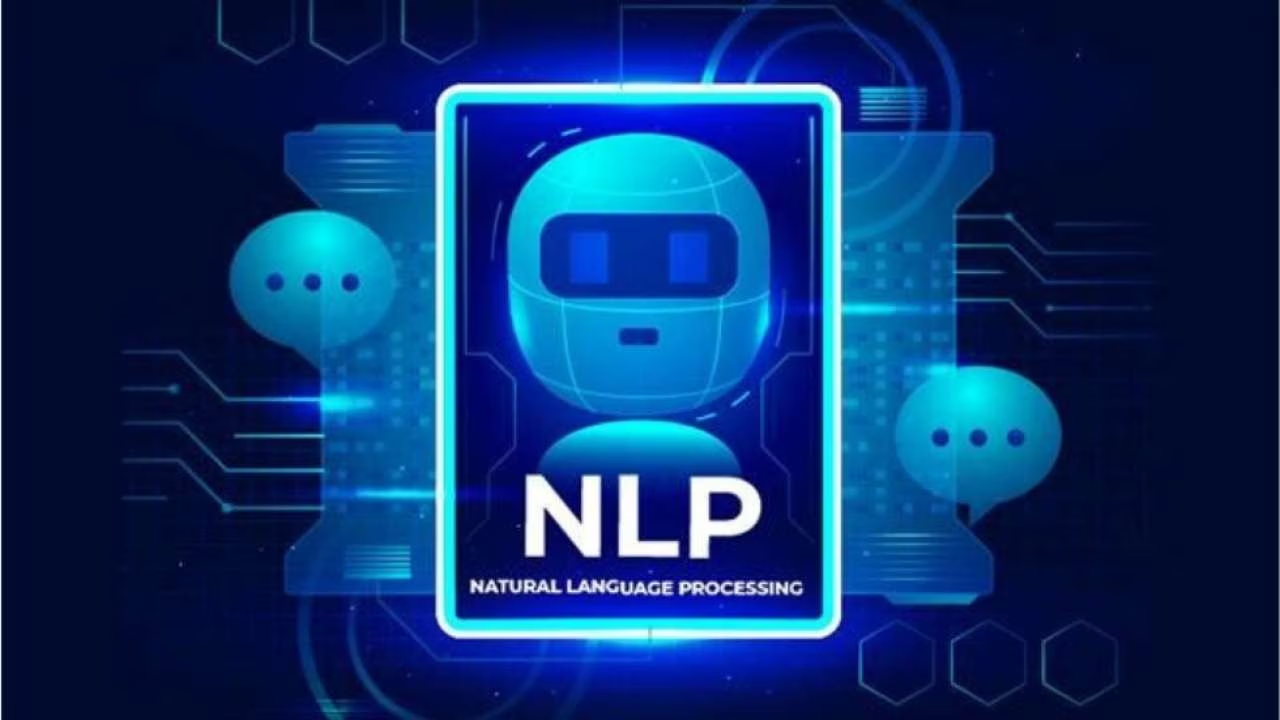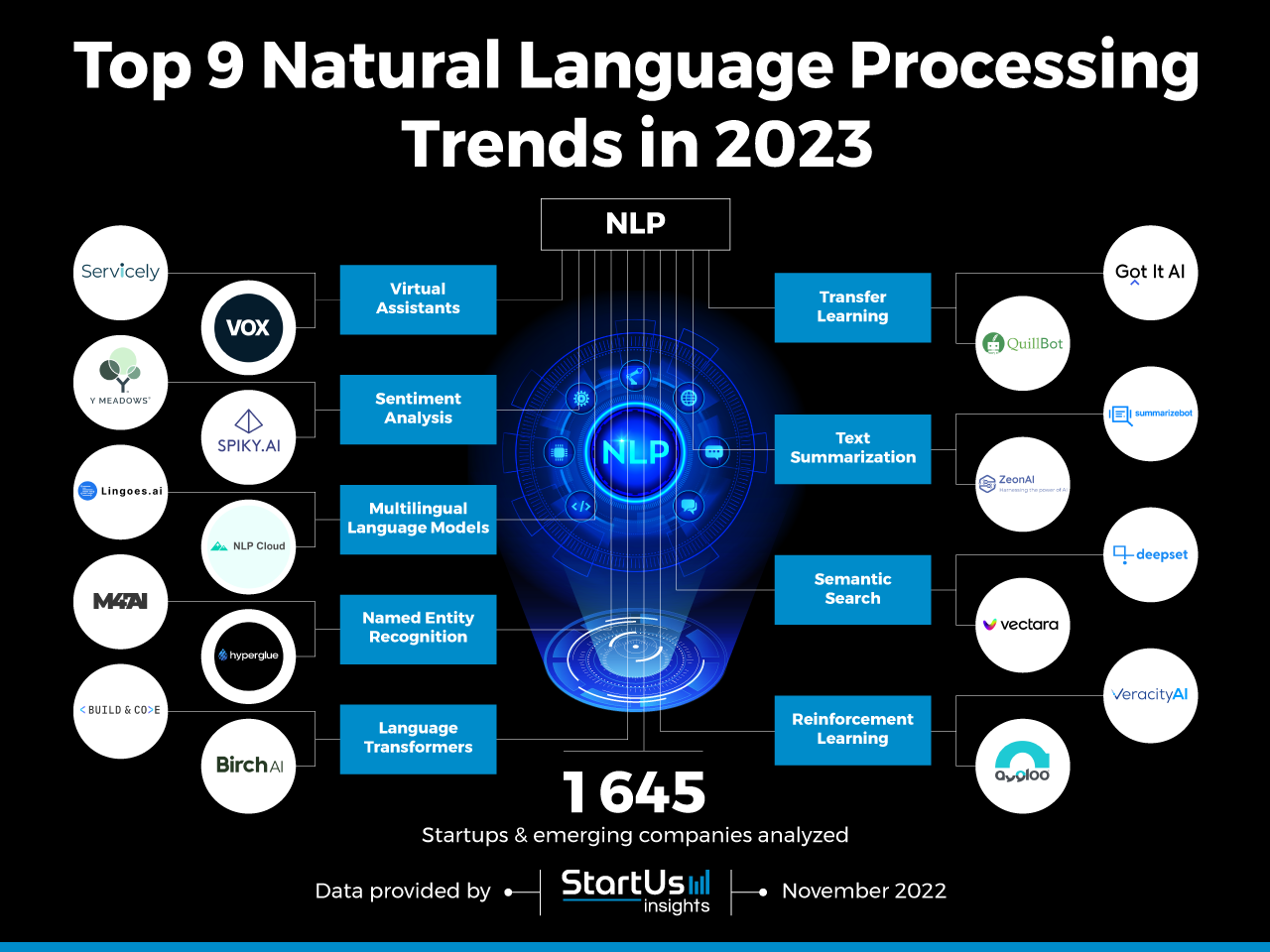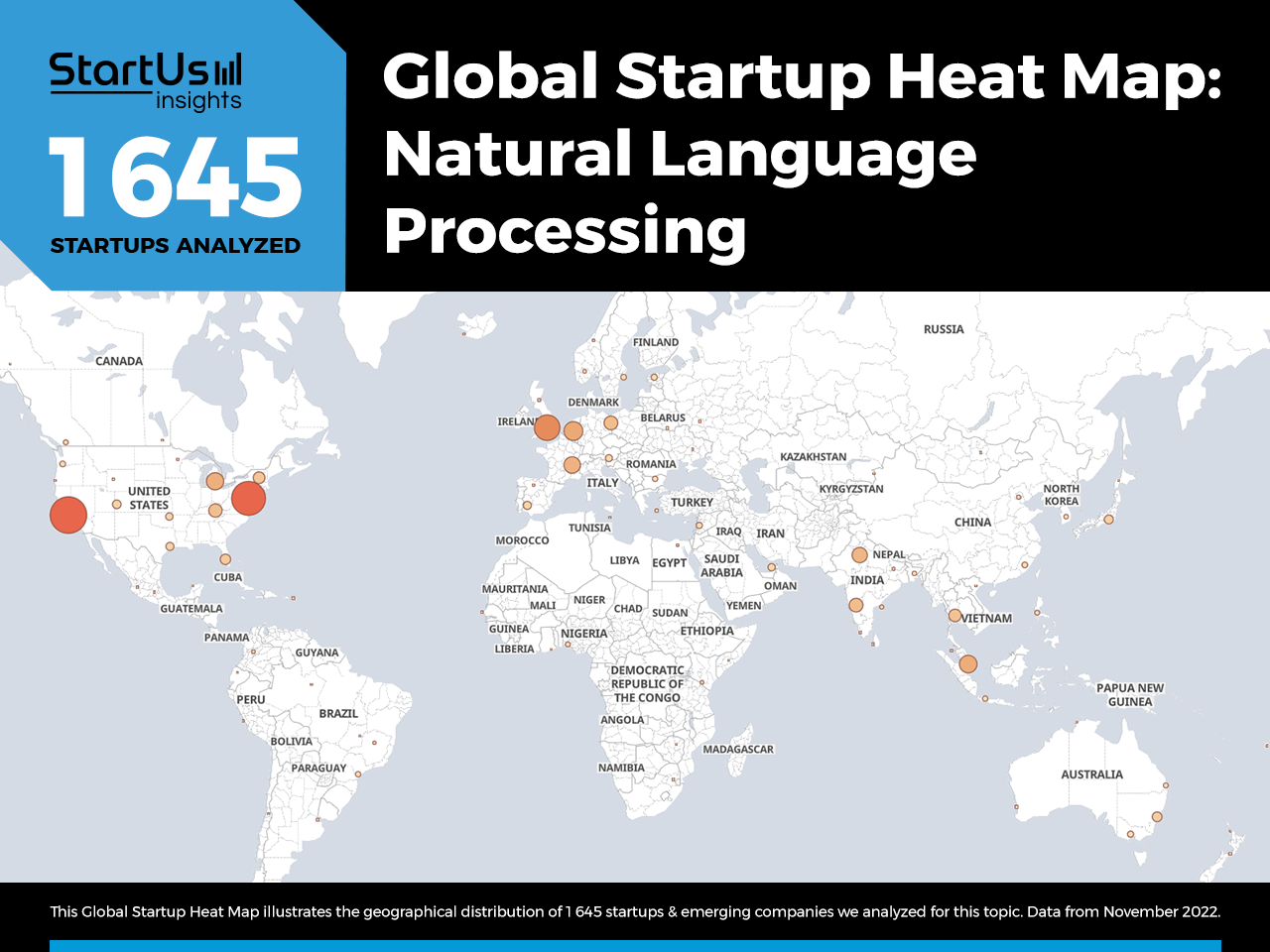AI language models could help diagnose schizophrenia
SOURCE: HTTPS://WWW.SCIENCEDAILY.COM/
OCT 09, 2023
9 Natural Language Processing Trends in 2023
SOURCE: HTTPS://WWW.STARTUS-INSIGHTS.COM/
JUL 13, 2023

Are you curious about which natural language processing trends & startups will soon impact your business? Explore our in-depth industry research on 1 645 NLP startups & scaleups and get data-driven insights into technology-based solutions in our Natural Language Processing Innovation Map!
Natural language processing (NLP) is a subset of AI which finds growing importance due to the increasing amount of unstructured language data. The rapid growth of social media and digital data creates significant challenges in analyzing vast user data to generate insights. Further, interactive automation systems such as chatbots are unable to fully replace humans due to their lack of understanding of semantics and context. To tackle these issues, natural language models are utilizing advanced machine learning (ML) to better understand unstructured voice and text data. This article provides an overview of the top global natural language processing trends in 2023. They range from virtual agents and sentiment analysis to semantic search and reinforcement learning.
For this in-depth research on the Top Natural Language Processing Trends & Startups, we analyzed a sample of 1 645 global startups & scaleups. The result of this research is data-driven innovation intelligence that improves strategic decision-making by giving you an overview of emerging technologies & startups advancing data processing. These insights are derived by working with our Big Data & Artificial Intelligence-powered StartUs Insights Discovery Platform, covering 2 500 000+ startups & scaleups globally. As the world’s largest resource for data on emerging companies, the SaaS platform enables you to identify relevant startups, emerging technologies & future industry trends quickly & exhaustively.
In the Innovation Map below, you get an overview of the Top 9 Natural Language Processing Trends & Innovations that impact 1 645 companies worldwide. Moreover, the Natural Language Processing Innovation Map reveals 18 hand-picked startups, all working on emerging technologies that advance their field.

The Global Startup Heat Map below highlights the global distribution of the 1 645 exemplary startups & scaleups that we analyzed for this research. Created through the StartUs Insights Discovery Platform, the Heat Map reveals that the US sees the most startup activity.
Below, you get to meet 18 out of these 1 645 promising startups & scaleups as well as the solutions they develop. These natural language processing startups are hand-picked based on criteria such as founding year, location, funding raised, & more. Depending on your specific needs, your top picks might look entirely different.

There is a growing interest in virtual assistants in devices and applications as they improve accessibility and provide information on demand. However, they deliver accurate information only if the virtual assistants understand the query without misinterpretation. That is why startups are leveraging NLP to develop novel virtual assistants and chatbots. They mitigate processing errors and work continuously, unlike human virtual assistants. Additionally, NLP-powered virtual assistants find applications in providing information to factory workers, assisting academic research, and more.
Australian startup Servicely develops Sofi, an AI-powered self-service automation software solution. Its self-learning AI engine uses plain English to observe and add to its knowledge, which improves its efficiency over time. This allows Sofi to provide employees and customers with more accurate information. The flexible low-code, virtual assistant suggests the next best actions for service desk agents and greatly reduces call-handling costs.
Vox is a Malaysian startup that automates conversational experiences. The startup’s virtual assistant engages with customers over multiple channels and devices as well as handles various languages. Besides, its conversational AI uses predictive behavior analytics to track user intent and identifies specific personas. This enables businesses to better understand their customers and personalize product or service offerings.
Our increasingly digital world generates exponential amounts of data as audio, video, and text. While natural language processors are able to analyze large sources of data, they are unable to differentiate between positive, negative, or neutral speech. Moreover, when support agents interact with customers, they are able to adapt their conversation based on the customers’ emotional state which typical NLP models neglect. Therefore, startups are creating NLP models that understand the emotional or sentimental aspect of text data along with its context. Such NLP models improve customer loyalty and retention by delivering better services and customer experiences.
US-based startup Y Meadows automates customer support requests using AI. The startup’s customer service automation solution collects data from customers through multiple channels, such as emails and web forms, and understands human intent. Its deep learning-based NLP model perceives message context instead of focusing on keywords. Y Meadow’s semantics-based solution finds use across industries for customer issue handling.
Spiky is a US startup that develops an AI-based analytics tool to improve sales calls, training, and coaching sessions. The startup’s automated coaching platform for revenue teams uses video recordings of meetings to generate engagement metrics. It also generates context and behavior-driven analytics and provides various unique communication and content-related metrics from vocal and non-verbal sources. This way, the platform improves sales performance and customer engagement skills of sales teams.
Communication is highly complex, with over 7000 languages spoken across the world, each with its own intricacies. Most current natural language processors focus on the English language and therefore either do not cater to the other markets or are inefficient. The availability of large training datasets in different languages enables the development of NLP models that accurately understand unstructured data in different languages. This improves data accessibility and allows businesses to speed up their translation workflows and increase their brand reach.
Finnish startup Lingoes makes a single-click solution to train and deploy multilingual NLP models. It features intelligent text analytics in 109 languages and features automation of all technical steps to set up NLP models. Additionally, the solution integrates with a wide range of apps and processes as well as provides an application programming interface (API) for special integrations. This enables marketing teams to monitor customer sentiments, product teams to analyze customer feedback, and developers to create production-ready multilingual NLP classifiers.
NLP Cloud is a French startup that creates advanced multilingual AI models for text understanding and generation. They feature custom models, customization with GPT-J, follow HIPPA, GDPR, and CCPA compliance, and support many languages. Besides, these language models are able to perform summarization, entity extraction, paraphrasing, and classification. NLP Cloud’s models thus overcome the complexities of deploying AI models into production while mitigating in-house DevOps and machine learning teams.
Data classification and annotation are important for a wide range of applications such as autonomous vehicles, recommendation systems, and more. However, classifying data from unstructured data proves difficult for nearly all traditional processing algorithms. Named entity recognition (NER) is a language processor that removes these limitations by scanning unstructured data to locate and classify various parameters. Besides identifying person names, organizations, brands, etc. NER classifies dates and times, email addresses, and numerical measurements like money and weight. NER models thus facilitate data extraction workflows across industries.
Spanish startup M47AI offers an AI-based data annotation platform to improve data labeling. It uses NER to identify and categorize names, locations, etc. The platform also tags words based on grammar, part of speech, function, and definition. It then performs entity linking to connect entity mentions in the text with a predefined set of relational categories. Besides improving data labeling workflows, the platform reduces time and cost through intelligent automation.
HyperGlue is a US-based startup that develops an analytics solution to generate insights from unstructured text data. It utilizes natural language processing techniques such as topic clustering, NER, and sentiment reporting. Companies use the startup’s solution to discover anomalies and monitor key trends from customer data.
Natural language solutions require massive language datasets to train processors. This training process deals with issues, like similar-sounding words, that affect the performance of NLP models. Language transformers avoid these by applying self-attention mechanisms to better understand the relationships between sequential elements. Moreover, this type of neural network architecture ensures that the weighted average calculation for each word is unique.
German startup Build & Code uses NLP to process documents in the construction industry. The startup’s solution uses language transformers and a proprietary knowledge graph to automatically compile, understand, and process data. It features automatic documentation matching, search, and filtering as well as smart recommendations. This solution consolidates data from numerous construction documents, such as 3D plans and bills of materials (BOM), and simplifies information delivery to stakeholders.
Birch.AI is a US-based startup that specializes in AI-based automation of call center operations. The startup’s solution utilizes transformer-based NLPs with models specifically built to understand complex, high-compliance conversations. This includes healthcare, insurance, and banking applications. Birch.AI’s proprietary end-to-end pipeline uses speech-to-text during conversations. It also generates a summary and applies semantic analysis to gain insights from customers. The startup’s solution finds applications in challenging customer service areas such as insurance claims, debt recovery, and more.
Machine learning tasks are domain-specific and models are unable to generalize their learning. This causes problems as real-world data is mostly unstructured, unlike training datasets. Consequently, this affects the predictability of the trained models. However, many language models are able to share much of their training data using transfer learning to optimize the general process of deep learning. The application of transfer learning in natural language processing significantly reduces the time and cost to train new NLP models.
US-based startup Got It AI offers a conversational AI platform that improves customer experience management. It uses transfer learning and NLP models with transformers such as BERT, GPT-3, and T5. Moreover, its product suite, AutoFlow, identifies the conversational paths that virtual agents follow and uses historical conversation data to improve customer engagement.
QuillBot is a US-based startup that makes an AI-powered paraphrasing tool. It uses natural language generation (NLG) and transfer learning to power its customizable text slider and AI-powered thesaurus that suggests synonyms. The tool also checks grammar, creates summaries, generates citations, and checks plagiarism. Additionally, it integrates directly into Google Chrome and Microsoft Word to enable better, faster, and smarter writing.
Natural language processors are extremely efficient at analyzing large datasets to understand human language as it is spoken and written. However, typical NLP models lack the ability to differentiate between useful and useless information when analyzing large text documents. Therefore, startups are applying machine learning algorithms to develop NLP models that summarize lengthy texts into a cohesive and fluent summary that contains all key points. The main befits of such language processors are the time savings in deconstructing a document and the increase in productivity from quick data summarization.
Latvian startup SummarizeBot develops a blockchain-based platform to extract, structure, and analyze text. It leverages AI to summarize information in real time, which users share via Slack or Facebook Messenger. Besides, it provides summaries of audio content within a few seconds and supports multiple languages. SummarizeBot’s platform thus finds applications in academics, content creation, and scientific research, among others.
Zeon AI Labs is an Indian startup that makes a summary generator. The startup’s summarization solution, DeepDelve, uses NLP to provide accurate and contextual answers to questions based on information from enterprise documents. Additionally, it supports search filters, multi-format documents, autocompletion, and voice search to assist employees in finding information. The startup’s other product, IntelliFAQ, finds answers quickly for frequently asked questions and features continuous learning to improve its results. These products save time for lawyers seeking information from large text databases and provide students with easy access to information from educational libraries and courseware.
Search engines are an integral part of workflows to find and receive digital information. One of the barriers to effective searches is the lack of understanding of the context and intent of the input data. NLP enables semantic search queries that analyze search intent. This improves search accuracy and provides more relevant results. Hence, semantic search models find applications in areas such as eCommerce, academic research, enterprise knowledge management, and more.
German startup deepset develops a cloud-based software-as-a-service (SaaS) platform for NLP applications. It features all the core components necessary to build, compose, and deploy custom natural language interfaces, pipelines, and services. The startup’s NLP framework, Haystack, combines transformer-based language models and a pipeline-oriented structure to create scalable semantic search systems. Moreover, the quick iteration, evaluation, and model comparison features reduce the cost for companies to build natural language products.
Vectara is a US-based startup that offers a neural search-as-a-service platform to extract and index information. It contains a cloud-native, API-driven, ML-based semantic search pipeline, Vectara Neural Rank, that uses large language models to gain a deeper understanding of questions. Moreover, Vectara’s semantic search requires no retraining, tuning, stop words, synonyms, knowledge graphs, or ontology management, unlike other platforms.
Currently, NLP-based solutions struggle when dealing with situations outside of their boundaries. Therefore, AI models need to be retrained for each specific situation that it is unable to solve, which is highly time-consuming. Reinforcement learning enables NLP models to learn behavior that maximizes the possibility of a positive outcome through feedback from the environment. This enables developers and businesses to continuously improve their NLP models’ performance through sequences of reward-based training iterations. Such learning models thus improve NLP-based applications such as healthcare and translation software, chatbots, and more.
Spanish startup AyGLOO creates an explainable AI solution that transforms complex AI models into easy-to-understand natural language rule sets. The startup applies AI techniques based on proprietary algorithms and reinforcement learning to receive feedback from the front web and optimize NLP techniques. AyGLOO’s solution finds applications in customer lifetime value (CLV) optimization, digital marketing, and customer segmentation, among others.
VeracityAI is a Ghana-based startup specializing in product design, development, and prototyping using AI, ML, and deep learning. The startup’s reinforcement learning-based recommender system utilizes an experience-based approach that adapts to individual needs and future interactions with its users. This not only optimizes the efficiency of solving cold start recommender problems but also improves recommendation quality.
Machine learning models such as reinforcement learning, transfer learning, and language transformers drive the increasing implementation of NLP systems. Text summarization, semantic search, and multilingual language models expand the use cases of NLP into academics, content creation, and so on. The cost and resource-efficient development of NLP solutions is also a necessary requirement to increase their adoption.
The Natural Language Processing Trends & Startups outlined in this report only scratch the surface of trends that we identified during our data-driven innovation & startup scouting process. Among others, transfer learning, semantic web, and behavior analysis will transform the sector as we know it today. Identifying new opportunities & emerging technologies to implement into your business goes a long way in gaining a competitive advantage. Get in touch to easily & exhaustively scout startups, technologies & trends that matter to you!
LATEST NEWS
WHAT'S TRENDING


Data Science
5 Imaginative Data Science Projects That Can Make Your Portfolio Stand Out
OCT 05, 2022

SOURCE: HTTPS://WWW.SCIENCEDAILY.COM/
OCT 09, 2023
SOURCE: HTTPS://WWW.THEROBOTREPORT.COM/
SEP 30, 2023
SOURCE: HTTPS://WWW.SCIENCEDAILY.COM/
AUG 08, 2023
SOURCE: HOUSTON.INNOVATIONMAP.COM
OCT 03, 2022
SOURCE: MEDCITYNEWS.COM
OCT 06, 2022